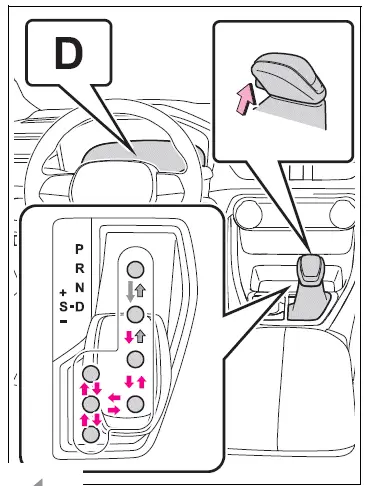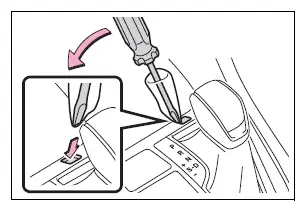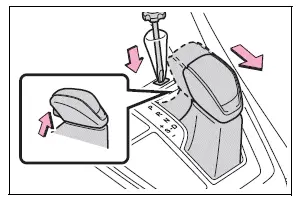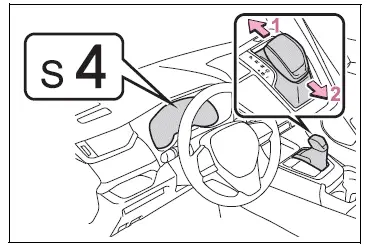Toyota RAV4 (XA50) 2019-2025 Owners Manual: Automatic transmission
Select the shift position depending on your purpose and situation.
Shift position purpose and functions
P - Parking the vehicle/
starting the engine
R - Reversing
N - Neutral
D - Normal driving*1
S - S mode driving*2
*1:Shifting to the D position allows the system to select a gear suitable for the driving conditions.
Setting the shift lever to the D position is recommended for normal driving.
*2:Selecting shift ranges using S mode restricts the upper limit of the possible gear ranges, controls engine braking force, and prevents unnecessary upshifting.
â– When driving with dynamic radar cruise control with full-speed range activated
Even when performing the following actions with the intent of enabling engine braking, engine braking will not activate because dynamic radar cruise control with full-speed range will not be canceled.
- While driving in S mode, downshifting to 7, 6, 5, or 4.
- When switching the driving mode to sport mode while driving in D.
â– If "High Transmission Fluid Temp" is displayed on the multi-information display (AWD models)
Make sure to return to D position driving and reduce speed by easing off the accelerator pedal. Stop the vehicle in a safe place, shift the shift lever to P and let the engine idle until the warning message goes out.
When the warning message goes out, the vehicle can be driven again.
If the warning message does not go out after waiting a while, have your vehicle inspected by your Toyota dealer.
â– AI-SHIFT
The AI-SHIFT automatically selects the suitable gear according to driver performance and driving conditions.
The AI-SHIFT automatically operates when the shift lever is in D.
(Shifting the shift lever to S cancels the function.)
WARNING
â– When driving on slippery road surfaces
Do not accelerate or shift gears suddenly.
Sudden changes in engine braking may cause the vehicle to spin or skid, resulting in an accident.
Shifting the shift lever

 While the engine switch
While the engine switch
is in ON and the brake pedal
depressed*, shift the shift lever
while pushing the shift release
button on the shift knob.
 Shift the shift lever
Shift the shift lever
while
pushing the shift release button
on the shift knob.
 Shift the shift lever
Shift the shift lever
normally.
When shifting the shift lever between P and D, make sure that the vehicle is completely stopped.
*: For the vehicle to be able to be shifted from P, the brake pedal must be depressed before the shift release button is pushed. If the shift release button is pushed first, the shift lock will not be released.
â– Shift lock system
The shift lock system is a system to prevent accidental operation of the shift lever in starting.
The shift lever can be shifted from P only when the engine switch is in ON, the brake pedal is depressed and the shift release button is pushed.
â– If the shift lever cannot be shifted from P
First, check whether the brake pedal is being depressed.
If the shift lever cannot be shifted even though the brake pedal is depressed and the shift release button is pushed, there may be a problem with the shift lock system. Have the vehicle inspected by your Toyota dealer immediately.
The following steps may be used as an emergency measure to ensure that the shift lever can be shifted.
Releasing the shift lock:
1. Pull the parking brake switch to check that the parking brake is set.
2. Turn the engine switch to OFF.
3. Depress the brake pedal.
4. Pry the cover up with a flathead screwdriver or equivalent tool.
To prevent damage to the cover, cover the tip of the screwdriver with a rag.

5. Press and hold the shift lock override button and then push the button on the shift knob.
The shift lever can be shifted while both buttons are pressed.

WARNING
â– To prevent an accident when releasing the shift lock
Before pressing the shift lock override button, make sure to set the parking brake and depress the brake pedal.
If the accelerator pedal is accidentally depressed instead of the brake pedal when the shift lock override button is pressed and the shift lever is shifted out of P, the vehicle may suddenly start, possibly leading to an accident resulting in death or serious injury.
Changing shift ranges in S mode
When the shift lever is in the S position, the shift lever can be operated as follows:

- Upshifting
- Downshifting
The selected shift range, from S1 to S8 will be displayed on the multi-information display.
The initial shift range in S mode is set automatically to 4, 5 or 6 according to vehicle speed.
However, the initial shift range may be set to 3 if AI-SHIFT has operated while the shift lever was in the D position.
â– S mode
- You can choose from 8 levels of accelerating force and engine braking force.
- A lower shift range will provide greater accelerating force and engine braking force than a higher shift range, and the engine revolutions will also increase.
- To prevent the engine from over-revving, upshifting may automatically occur.
- To protect the automatic transmission, a function is adopted that automatically selects a higher shift range when the fluid temperature is high.
- When the shift range is 7 or lower, holding the shift lever toward "+" sets the shift range to 8.
â– Downshifting restriction warning buzzer
To help ensure safety and driving performance, downshifting operation may sometimes be restricted. In some circumstances, downshifting may not be possible even when the shift lever is operated. (A buzzer will sound twice.)
â– If the "S" indicator does not come on or the "D" indicator is displayed even after shifting the shift lever to S
This may indicate a malfunction in the automatic transmission system.
Have the vehicle inspected by your Toyota dealer immediately. (In this situation, the transmission will operate in the same manner as when the shift lever is in D.)
 Engine (ignition) switch
(vehicles with smart key
system)
Engine (ignition) switch
(vehicles with smart key
system)
Performing the following
operations when carrying
the electronic key on your
person starts the engine or
changes engine switch
modes.
Starting the engine
1. Pull the parking brake switch
to check that ...
 Turn signal lever
Turn signal lever
Operating instructions
Right turn
Lane change to the right
(move the lever partway and
release it)The right hand signals will flash 3
times.
Lane change to the left
(move the lever partway an ...
Other materials:
Front wiper rubber
Components
Removal
Remove front wiper blade
Detach the claw as shown in the illustration.
Remove the wiper blade as shown in the illustration.
Notice:
Do not fold the wiper arm with the wiper blade
removed. The arm tip may damage the
windshield surface.
Rem ...
PKSB (Parking Support
Brake)
The Parking Support Brake
system consists of the following
functions that operate
when driving at a low
speed or backing up, such
as when parking. When the
system determines that the
possibility of a collision
with a detected object is
high, a warning operates to
urge the driver to take evasive
acti ...
Definition of terms
Terms
Definition
Monitor description
Description of what ecm monitors and how detects malfunctions
(monitoring purpose and
details).
Related dtcs
Group of diagnostic trouble codes that are output by ecm based on
same malfunction
detection logic.
...
